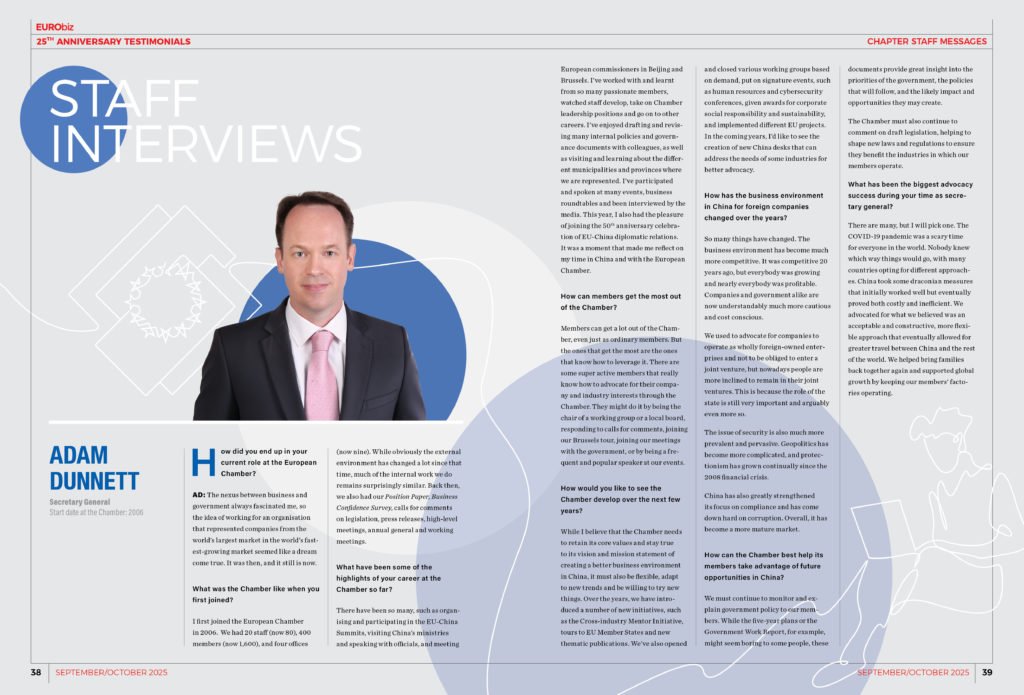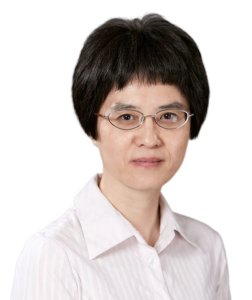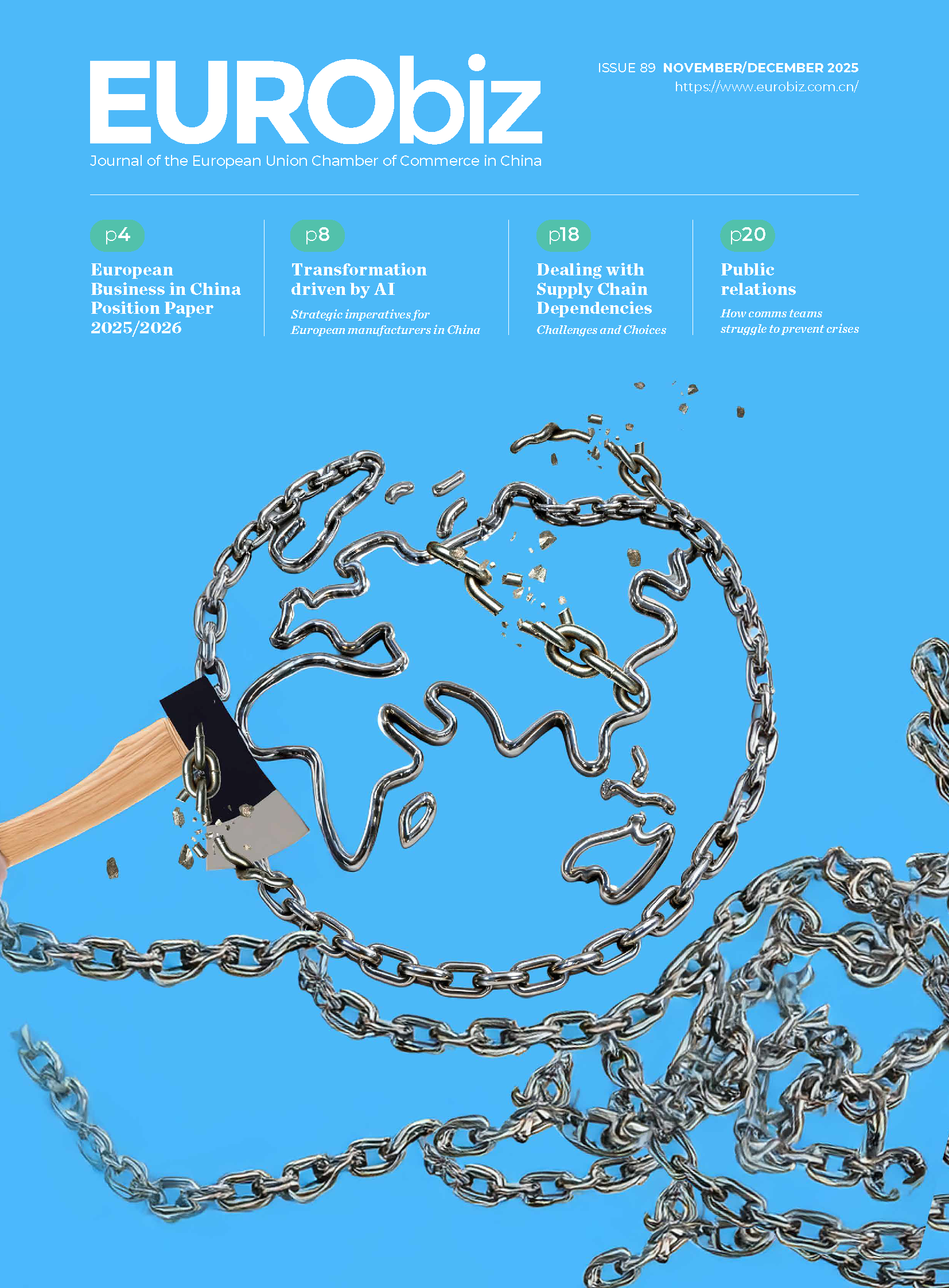
How did you end up in your current role at the European Chamber?

Secretary General
Start date at the Chamber: 2006
The nexus between business and government always fascinated me, so the idea of working for an organisation that represented companies from the world‘s largest market in the world’s fastest-growing market seemed like a dream come true. It was then, and it still is now.
What was the Chamber like when you first joined?
I first joined the European Chamber in 2006. We had 20 staff (now 80), 400 members (now 1,600), and four offices (now nine). While obviously the external environment has changed a lot since that time, much of the internal work we do remains surprisingly similar. Back then, we also had our Position Paper, Business Confidence Survey, calls for comments on legislation, press releases, high-level meetings, annual general and working meetings.
What have been some of the highlights of your career at the Chamber so far?
There have been so many, such as organising and participating in the EU-China Summits, visiting China’s ministries and speaking with officials, and meeting European commissioners in Beijing and Brussels. I’ve worked with and learnt from so many passionate members, watched staff develop, take on Chamber leadership positions and go on to other careers. I’ve enjoyed drafting and revising many internal policies and governance documents with colleagues, as well as visiting and learning about the different municipalities and provinces where we are represented. I’ve participated and spoken at many events, business roundtables and been interviewed by the media. This year, I also had the pleasure of joining the 50th anniversary celebration of EU-China diplomatic relations. It was a moment that made me reflect on my time in China and with the European Chamber.
How can members get the most out of the Chamber?
Members can get a lot out of the Chamber, even just as ordinary members. But the ones that get the most are the ones that know how to leverage it. There are some super active members that really know how to advocate for their company and industry interests through the Chamber. They might do it by being the chair of a working group or a local board, responding to calls for comments, joining our Brussels tour, joining our meetings with the government, or by being a frequent and popular speaker at our events.
How would you like to see the Chamber develop over the next few years?
While I believe that the Chamber needs to retain its core values and stay true to its vision and mission statement of creating a better business environment in China, it must also be flexible, adapt to new trends and be willing to try new things. Over the years, we have introduced a number of new initiatives, such as the Cross-industry Mentor Initiative, tours to EU Member States and new thematic publications. We’ve also opened and closed various working groups based on demand, put on signature events, such as human resources and cybersecurity conferences, given awards for corporate social responsibility and sustainability, and implemented different EU projects. In the coming years, I’d like to see the creation of new China desks that can address the needs of some industries for better advocacy.
How has the business environment in China for foreign companies changed over the years?
So many things have changed. The business environment has become much more competitive. It was competitive 20 years ago, but everybody was growing and nearly everybody was profitable. Companies and government alike are now understandably much more cautious and cost conscious.
We used to advocate for companies to operate as wholly foreign-owned enterprises and not to be obliged to enter a joint venture, but nowadays people are more inclined to remain in their joint ventures. This is because the role of the state is still very important and arguably even more so.
The issue of security is also much more prevalent and pervasive. Geopolitics has become more complicated, and protectionism has grown continually since the 2008 financial crisis.
China has also greatly strengthened its focus on compliance and has come down hard on corruption. Overall, it has become a more mature market.
How can the Chamber best help its members take advantage of future opportunities in China?
We must continue to monitor and explain government policy to our members. While the five-year plans or the Government Work Report, for example, might seem boring to some people, these documents provide great insight into the priorities of the government, the policies that will follow, and the likely impact and opportunities they may create.
The Chamber must also continue to comment on draft legislation, helping to shape new laws and regulations to ensure they benefit the industries in which our members operate.
What has been the biggest advocacy success during your time as secretary general?
There are many, but I will pick one. The COVID-19 pandemic was a scary time for everyone in the world. Nobody knew which way things would go, with many countries opting for different approaches. China took some draconian measures that initially worked well but eventually proved both costly and inefficient. We advocated for what we believed was an acceptable and constructive, more flexible approach that eventually allowed for greater travel between China and the rest of the world. We helped bring families back together again and supported global growth by keeping our members’ factories operating.

General Manager and Director of Communications
Start date at the Chamber: 2011
How did you end up in your current role at the European Chamber?
I was director of communications at the Chamber when the previous general manager left. I didn’t apply for the role at first because I wanted to continue working on policy, media and publications, as it’s a very stimulating role. After some time, a suitable candidate had still not been found, so I was encouraged to apply. During subsequent discussions, I was asked to entertain the idea of becoming general manager while retaining my communications role. I accepted because I thought it would be a big challenge. I wasn’t wrong.
What was the Chamber like when you first joined?
The Chamber’s work was much the same as it is now, albeit the environment was far less complex. Over the past nearly 15 years, China’s economy has grown significantly, as has its influence in global affairs, and with that have come far more challenges.
There was also more optimism about the Chinese market in the very early 2010s – despite relatively limited economic reforms during that time, there was a feeling that China would continue to open up.
What have been some of the highlights of your career at the Chamber so far?
I’m extremely proud of a lot of the work that the Chamber has done, and invariably it has been the result of strong teamwork, so I guess the main highlight has been working with many talented and interesting people. I don’t really like to reflect too much on individual highlights – when you look back there is a tendency to do so through rose-tinted glasses. That can cause sentimentality to creep in, and that can make you complacent. I think it’s better to keep moving forward and try to improve what you do.
How can members get the most out of the Chamber?
It’s all about engagement – you get out what you put in. The principal goal of the Chamber is to improve the operating conditions for European business in China, and the primary vehicle for delivering that is advocacy. Advocacy boils down to exerting influence on key decision makers through compelling and persuasive narratives, so that they understand your problem, empathise, and then, hopefully, implement solutions. Members that fully engage shape the Chamber’s messaging based on the challenges they’re facing and the recommendations they want to convey, and by doing so they are more likely to affect positive change and get the results they are looking for.
How would you like to see the Chamber develop over the next few years?
I think the Chamber is in a good position based on the years of hard work that has gone into our advocacy work, and the credibility we have established—with both the Chinese and European governments, as well as media—but there is always room for improvement. We live in increasingly challenging times, both politically and economically, so the Chamber must adapt to the new realities we confront every day, while continuing to deliver core services to our members.

HR & Operations Director
Start date at the Chamber: 2007
How did you end up in your current role at the European Chamber?
I joined the Chamber’s operations team in 2007. I reported to both the operations manager and the secretary general, which gave me the opportunity to work with internal and external stakeholders at different levels, and take on some of the work of the EU projects, such as the EU-China Managers Exchange and Training Programme, and the China IP SME Helpdesk.
In my current role working as HR and operations director, I am constantly looking for smart and talented individuals to work at the Chamber, while overseeing our employees’ development as they progress in their careers here. Meanwhile, I get to share the best HR practices through my coordination of the European Chamber’s HR Forum in Beijing and my management of the Cross-industry Mentor Initiative (CIMI).
What was the Chamber like when you first joined?
The Chamber had around 1,100 members when I first joined, but it didn’t have that many staff at the time. There were many high-level visits and meetings in our office, and the offline events were always at capacity.
What have been some of the highlights of your career at the Chamber so far?
I am proud that we have hired—and continue to hire—so many well-educated and talented staff. We give them the opportunity to work with senior-level professionals while they’re still in the early stages of their careers. This allows them to develop their stakeholder management skills while perfecting the ability to tailor content for different audiences – from advocacy points for our position papers to putting together presentations for working group meetings.
Another highlight has been the CIMI, which I am responsible for. So far, we have delivered five cycles of the initiative, receiving strong support from the C-suite level leaders that act as mentors. Many of the 80 mentees enrolled in the initiative have seen significant benefits for their career development.
How can members get the most out of the Chamber?
Members can get the most out of the Chamber by joining our working groups, contributing to our annual Position Paper and Business Confidence Survey, and attending our events. We need members to play a full role and keep us informed of what is going on in their industry – it helps to shape our advocacy.
How would you like to see the Chamber develop over the next few years?
In recent years, some members have changed their China strategies due to the current geopolitical tensions and economic uncertainties. While I am personally a bit pessimistic about the future, the Chamber needs to continue to advocate for its members, supported by accountable leadership at all levels. Ensuring the quality of everything that we do is the key to our future.

Senior Project Manager
Start date at the Chamber: 2007
How did you end up in your current role at the European Chamber?
Joining the Chamber in 2007, I never imagined these 18 years would become such
a vital part of my life – it’s been a journey of mutual growth. For the first
11 years, I served as the manager of the Tianjin Chapter, a period I now see as
‘putting down roots’. Every day, I worked closely with local member companies:
solving their specific operational issues, organising government-business
matchmaking sessions, and watching Tianjin’s membership grow from just a dozen
to over 100. That sense of witnessing a platform mature was incredibly warm and
rewarding.
In 2018, I moved to the Beijing Chapter, eventually taking on a project management role.
What was the Chamber like when you first joined?
Back in 2007, the Chamber was still finding its feet. Its membership, business scope and influence were far smaller than today. Take the Tianjin Chapter, for example: we only had a dozen members, and activities focussed on meeting basic needs – like policy briefings to help companies understand local operating rules and small networking events to connect members. For the first two years, I worked alone; now, Tianjin has a team of four talented colleagues.
What have been some of the highlights of your career at the Chamber so far?
Over 18 years, I’ve been both a witness and a participant in the Chamber’s growth. In Tianjin, the core focus was on solving members’ practical difficulties to help them develop – being able to ease members’ challenges made my work meaningful. Working in Beijing, leading projects like the Finland Turku Desk, EU SME training programmes and the Cosmetics Desk has brought immense satisfaction. These initiatives not only delivered real value to members but also strengthened the Chamber’s financial position. At various times, I’ve also helped support the operations of the South China, Shanghai and Shenyang chapters, something that has made me feel truly part of the Chamber family.
But the biggest highlight has undoubtedly been ‘growing with the Chamber’. I watched it evolve from a regional platform to an influential bridge for EU-China cooperation, while I grew from a local manager to cross-regional leader.
How can members get the most out of the Chamber?
The key is mutual engagement. We often talk about the Chamber’s ‘ABC’ framework: Advocacy, Business Intelligence, and Community. But this isn’t a one-size-fits-all template – it needs to adapt to members’ needs. For the Chamber, our responsibility is to listen to members’ concerns so we can provide targeted, precise support.
For members, it is essential to get involved: come and join the events, participate in working groups and network with fellow members. By working through and with the Chamber, members can maximise the benefits of their membership.
How would you like to see the Chamber develop over the next few years?
Looking ahead, I hope the Chamber continues to promote cooperation between the EU and China. Beyond its existing strengths—like advocacy and business intelligence—the Chamber could explore more EU-focussed projects to unlock additional opportunities and expand its influence.

Head of Industry Desks
Start date at the Chamber: 2012
How did you end up in your current role at the European Chamber?
My path to this role was rather serendipitous. It began with a number of recommendations from industry experts in both China and Europe that thought I had potential. These recommendations eventually led to a position at the Chamber.
What was the Chamber like when you first joined?
When I first joined the Chamber, while there were some operational challenges typical of a fast-growing organisation, these were overshadowed by our increasing impact. It was—and remains—a fun and challenging place to work.
What have been some of the highlights of your career at the Chamber so far?
I have particularly enjoyed the chance to mentor and develop new staff. During my time here, I have mentored nine government affairs staff members and several interns that later took full-time positions at the Chamber. It’s a very rewarding experience to be able to pass on your own knowledge and skills to others.
How can members get the most out of the Chamber?
For members, we’re more than a service provider – we’re partners in overcoming challenges together. The Chamber’s value lies in being both an ally during difficult times and a growth accelerator for businesses navigating China’s complex environment.
How would you like to see the Chamber develop over the next few years?
I think the Chamber will remain essential for European businesses in China – from huge multinationals to small and medium-sized enterprises. We will continue helping them to thrive while advocating on their behalf. This isn’t just empty rhetoric. Corporate success drives industrial and economic progress – something that ultimately benefits every one of us.

Senior Government Affairs Manager
Start date at the Chamber: 2005
How did you end up in your current role at the European Chamber?
I’ve been at the Chamber for 20 years now. I started as a receptionist and assistant to the secretary general for a year before moving to government relations. I then took on a position at the EU-funded China IPR SME Helpdesk – the first EU project run by the Chamber. After nine years, I transitioned to my current role, leading the Fashion and Leather Desk.
What was the Chamber like when you first joined?
At the time, working for a chamber of commerce was something new and fresh to me. I didn’t even know the meaning of ‘advocacy’ when they asked me in my initial interview. The Chamber felt like a very fashionable place to me; it was a young organisation in a fancy office. Some of my earliest memories are of the president and secretary general taking the Position Paper to various stakeholders, such as embassies and think tanks.
What have been some of the highlights of your career at the Chamber so far?
My time with the Helpdesk tops the list of my longest-serving positions at the Chamber. The Helpdesk is a bit unique as it’s run quite independently from the main operations of the Chamber. We were once visited by Peter Mandelson, the former EU commissioner for trade, and he was full of praise for the work we were doing. I also have fond memories of my first business trip to Europe, which allowed me to take a photo in front of the symbolic headquarters of the European Commission. My current work for the Fashion and Leather Desk is very rewarding. Although it’s about luxury, the role is very fundamental, pragmatic and driven by members’ needs. While it is not a hot topic at the Chamber, it is still ‘seen’ by members. When reviewing my time at the Chamber, I realise that my growth has been significant, probably due to having run an industry desk, which requires you to be able to think independently, engage with members, and proficiently allocate the resources and tools available.
How can members get the most out of the Chamber?
Stay in regular contact with Chamber staff, communicate issues and needs, and ensure that we know what is going on in your industry. This helps to shape our advocacy. While advocacy is not an instant solution, it can at least start to give visibility to issues being experienced by European companies.
How would you like to see the Chamber develop over the next few years?
I want to see the Chamber continue to focus on members’ needs. With 25 years of advocacy experience under our belt, we are well positioned to serve our members and advocate on behalf of European businesses in China.
How did you end up in your current role at the European Chamber?

Finance Director
Start date at the Chamber: 2005
After graduating from Massey University in New Zealand in 2004, I returned to China. At that time, I was eager to find a job related to finance in a foreign company. I came across an advertisement for the position of interim office manager at the European Chamber, which was vacant due to maternity leave. The name of the organisation sparked my curiosity, and eventually, I was fortunate enough to get this temporary position.
What was the Chamber like when you first joined?
When I joined the Chamber, there were only three chapters: Beijing, Shanghai and Nanjing. The Beijing office had just seven employees, meaning that each employee had to play several different roles. Initially, I basically served as assistant to the secretary general, receptionist and office manager, while also being responsible for event logistics.
What have been some of the highlights of your career at the Chamber so far?
I am extremely grateful to the Chamber for giving me the opportunity to try out various positions, enabling me to develop skills in different areas. As the Chamber has continued to grow, more and more staff have been hired, meaning that most staff can now put all their energy into one role. From 2007 I worked purely in finance roles, becoming finance director in 2018.
Every position has taught me many different skills and provided opportunities for me to use them effectively at the Chamber.
As a finance professional, I have been involved in the work of over a dozen EU projects. Changes in Chinese laws and regulations once made the tax status of the Chamber unclear. After long-term advocacy efforts, the Chamber was finally included in the list of non-profit organisations eligible for tax exemption in 2024.
How can members get the most out of the Chamber?
Members can get the most out of the Chamber by sharing their aspirations and challenges, allowing us to ensure we are advocating on their most important issues.
How would you like to see the Chamber develop over the next few years?
I want to see the Chamber continue to put its members’ interests first, so that we remain the trusted voice of European business interests in China. I hope we can expand our membership and, if it makes sense, perhaps even open another chapter.


Recent Comments